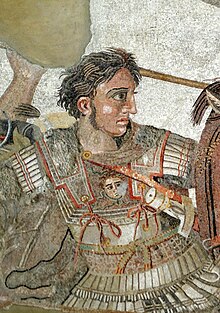Alexander. Novel of utopia
Alexander. The novel of utopia is Klaus Mann's second novel , a novel about Alexander the Great , which was first published in 1929 by the S. Fischer publishing house in Berlin.
action
Klaus Mann tells the life of the Macedonian king Alexander (356–323 BC), who tries to realize an old dream of mankind and to create a world empire of freedom and love. After the murder of his father Philip II , he was proclaimed king at the age of twenty and his mother Olympias gave him the task of conquering Asia. But while his triumphal procession begins with flowers and songs of jubilation, in the end, when his empire stretches from Egypt to the Indus, he only brings oppression and misery to people and is perceived as a “visitation”. The hero gets a human face with all its dark sides, he becomes guilty of his fellow human beings, so he kills his friend and lifesaver Kleitos, who rejected his love, in affect and at the end of the loneliness he falls.
effect
Those who value historically correct facts will be disappointed. Klaus Mann had studied Aristotle , Plutarch and the historian Johann Gustav Droysen (History of Alexander the Great) for this novel, but he was more concerned with the psychological and analytical interpretations of the king. The reactions of the critics after the publication were mixed. Hermann Kasack praised in the literary world that the work was, despite some "linguistic impurities", a "sympathetic symptom of a new level of development" of the author and WE Süskind wrote in the Neue Rundschau that Klaus Mann had "thrown crutches". Rudolf Arnheim criticized the Weltbühne that this book was “infantile” and remarked that “the true is colored by the desirable and the natural is made up by the decorative”.
Compared to his first novel The Pious Dance , the writing style becomes tighter and less pathetic. However, Klaus Mann remains a representative of the old writing style, which, unlike the writers of the " Lost Generation " Gertrude Stein , Sherwood Anderson and Ernest Hemingway , does not express itself in short, concise sentences.
The novel was published in an American edition in 1930 and a French edition in 1931. The poet Jean Cocteau wrote a preface for the latter . Due to the global political situation, the seizure of power by the National Socialists and the resulting exile of Klaus Mann, no further editions were issued; Only 14 years after his death did the Nymphenburger Verlagshandlung publish a new edition in 1963, which also contained Cocteau's foreword. After several other editions, a new edition was published in 2006 on the 100th birthday of Klaus Mann with an afterword by Dirk Heisserer .
output
- Klaus Mann: Alexander. Novel of utopia (= Rororo 24412). With a foreword by Jean Cocteau and an afterword by Dirk Heißerer . Extended new edition. Rowohlt-Taschenbuch-Verlag, Reinbek near Hamburg 2006, ISBN 3-499-24412-8 .
literature
- Uwe Naumann : Klaus Mann (= Rororo 50695 Rowohlt's monograph ). Revised new edition. Rowohlt-Taschenbuch-Verlag, Reinbek near Hamburg 2006, ISBN 3-499-50695-5 .
- Uwe Naumann (Ed.): “There is no peace until the end”. Klaus Mann (1906–1949). Pictures and documents. Rowohlt-Taschenbuch-Verlag, Reinbek near Hamburg 2001, ISBN 3-499-23106-9 .
- Stefan Zweig : Two historical novels: Richard Friedenthal, “The Conqueror” - Klaus Mann, “Alexander”. In: Stefan Zweig: Encounters with books. Articles and introductions from the years 1902–1939 (= Fischer 2292). (Edited and with a comment by Knut Beck). Fischer-Taschenbuch-Verlag, Frankfurt am Main 1983, ISBN 3-596-22292-3 , pp. 133-137, ( E-Text ).
